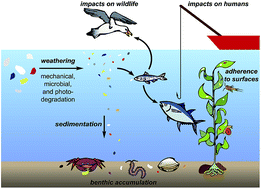Research highlights: impacts of microplastics on plankton
Abstract
Each year, millions of metric tons of the plastic produced for food packaging, personal care products, fishing gear, and other human activities end up in lakes, rivers, and the ocean. The breakdown of these primary plastics in the environment results in microplastics, small fragments of plastic typically less than 1–5 mm in size. These synthetic particles have been detected in all of the world's oceans and also in many freshwater systems, accumulating in sediment, on shorelines, suspended in surface waters, and being ingested by plankton, fish, birds, and marine mammals. While the occurrence of plastics in surface waters has been surveyed in a number of studies, the impacts of microplastics on marine organisms are still being elucidated. This highlight features three recent publications that explore the interactions of microplastics with planktonic organisms to clarify the effects of these pollutants on some of the ocean's smallest and most important inhabitants.


 Please wait while we load your content...
Please wait while we load your content...